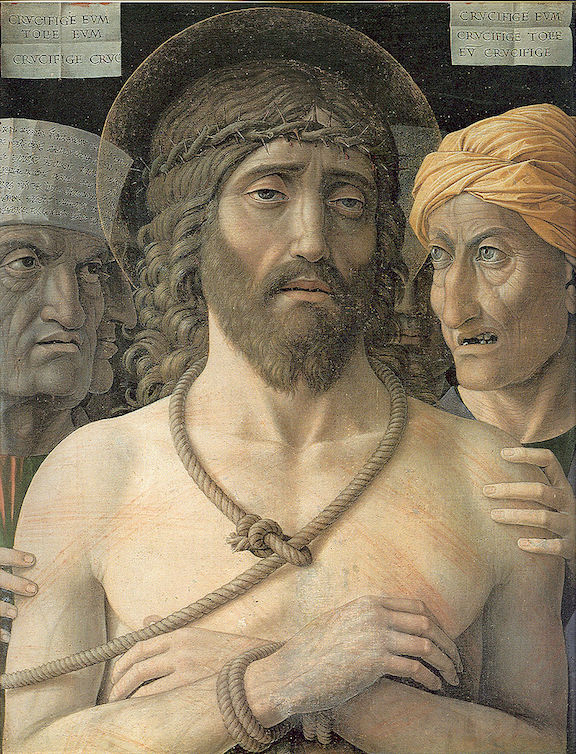Of all the Easter season readings, the one that always troubles me most is from Matthew 27:25 when the crowd cries out: “Let his blood be upon us and upon our descendants.” It might be worth remembering that this passage is found in the Gospel of Matthew, and Matthew was himself a Jew. Is he calling down upon his own people a centuries-long curse? I think not. This is a common-enough misunderstanding, one with especially tragic consequences in this instance, but one that fits a common pattern.
The “pattern” involves taking a passage that has to do with Christ’s selfless sacrifice for all mankind and interpreting it in an essentially pagan way – as though Christ were Zeus or Apollo.
A prime example of this same misunderstanding involves the way some people interpret Ephesians 5:22-25 where St. Paul sets up an analogy between husbands and wives and Christ and the Church. Wives should look to their husbands as the Church looks to Christ, and husbands are supposed to love their wives as Christ loved the Church.
Now for some reason – and I think this has as much to do with our sinful natures as it does bad habits of biblical interpretation – some people, especially men, seem to think this means husbands get to “lord it over” their wives. When exactly did Christ ever “lord it over” the Church, if by “lord it over” we mean demand service like a pagan king? Christ washed the feet of his disciples and said “he who would be first must serve the rest.” So to my mind, when a husband says to his wife, “I am supposed to be like Christ to you,” she should promptly take off her socks and stick out her feet to be washed.
Pagan gods like Zeus and Apollo demand that humans sacrifice to them. The Christian God sacrifices Himself fully for us and dies forgiving the sins even of those who crucified Him. What causes us to turn this on its head, and instead of seeing St. Paul’s comment as an admonition to service, take it as permission to demand that we be served?

But this brings us back to that troubling comment: “Let his blood be upon us.” As Christians, what do we believe? We believe that in Christ’s blood, we are healed and our sins forgiven. In the Eucharist, Christ’s body and blood is offered to us just as it was to the first apostles.
Receiving Christ’s body and blood in the Eucharist is one of the most powerful ways in which we participate in Christ’s salvific death and resurrection, and receive His gifts of divine grace. What causes us to turn this blessing around and think of it as a curse, when Matthew’s obvious intent in recounting this story was to say that what was originally a curse had become, in Christ’s sacrifice, a blessing?
Jesus was a Jew. So were Mary and all the first apostles. We understand the New Covenant in terms of the Old, which is why we have so many readings from the Old Testament at the Easter Vigil Mass. The one Old Testament reading that must never be omitted during the Easter Vigil, according to the General Instructions on the Roman Missal, is the reading from Exodus about God’s rescue of His people: the event that is at the heart of the Old Testament Passover. We cannot properly understand the New Testament Last Supper, the Paschal celebration, without this context. As Christ himself says “Salvation is from the Jews.” (John 4:22)
The Romans crucified Christ. What was the significance of the Jews crying out for his crucifixion? According to John 1:11: “He came unto His own, and His own rejected Him.” He was rejected not just by the “foreign” Romans but by His own people. And who are “His own” people? Whom do the Jewish people represent? All of us: all of humanity, steeped in sin, who have rejected God.
Not without reason do we all cry out at the Palm Sunday service: “Crucify him! Crucify him!” This isn’t just the Jews; it is us. And we say with them: “Let his blood be upon us and upon our children.” And it is upon us, because it is the blood of the Cross that makes us whole, the blood of the new and eternal covenant, the blood of Christ outpoured by which we are saved.
Could we wish any greater blessing on a crowd than that the blood of Christ should be upon them and upon their children?
Do you see how Christ’s sacrifice turned what was intended as a curse into a blessing, not only for those present but for us all? Those who take this passage as an excuse to hate or persecute Jews are missing the whole point. Worse, they are turning Christ’s blessing, purchased at so great a cost with His own blood, back into a curse. If that isn’t the gravest crime one can commit against Christ’s salvific sacrifice, I don’t know what is.
Ah holy Jesus, how hast thou offended
That man to judge thee hath in hate pretended?
By foes derided, by thine own rejected, O most afflicted.
Make no mistake. When we sing this hymn, we are His foes; we are His own who rejected Him; we are the ones who have trafficked in hatred disguised as righteousness. We are the ones who afflict Him. And yet through it all, He loves us still – a love He showed most fully shedding His blood for us on the Cross.
So let His blood be upon us and upon our descendants, for it is in His blood that we are redeemed and have eternal life.















